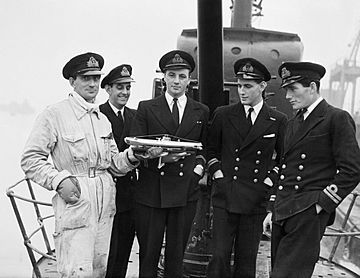Bill Jewell facts for kids

Captain Norman "Bill" Jewell (born October 24, 1913 – died August 18, 2004) was a brave officer in the Royal Navy. He was known for his important role during the Second World War. As the commander of the submarine HMS Seraph, Jewell helped with a very clever trick. This trick was called Operation Mincemeat. It was one of the most important secrets of the war. The story of Operation Mincemeat has been told in many books and movies.
Contents
Norman Jewell was born on Mahé Island in the Seychelles on October 24, 1913. His father was a doctor and worked for the British government there. When the First World War began, his father joined the army. After the war, Jewell's family moved to Kenya. Norman went to school in England. He joined the Royal Navy in 1936.
Jewell served on several submarines, including HMS Osiris and HMS Otway. In November 1940, he joined HMS Truant. Its commander, Lt-Cdr Haggard, was a great leader. He taught Jewell a lot. Once, Haggard sailed Truant through a dangerous minefield near Tripoli. He did this by following an Italian ship. Six months later, he led big warships through the same minefield. They went to attack Tripoli.
On May 27, 1942, Jewell became the commander of HMS Seraph. The submarine had a crew of 44 men. Jewell did not know then how famous his submarine would become.
Secret Mission: Operation Flagpole
Seraph was chosen for a very secret mission called Operation Flagpole (World War II). Jewell's job was to take an American General, Mark Clark, and his team to meet French officers. This meeting was in Algeria. On October 19, Jewell landed General Clark's group on a beach. They used small, foldable canoes. Three members of the British Special Boat Section helped paddle them.
Seraph stayed hidden underwater all day. After dark, Jewell brought the submarine very close to the shore. The water was less than 10 feet deep! The sea was too rough to pick up the canoes from the beach. So, Jewell brought Seraph even closer, almost touching the ground. General Clark and his team quickly got into the boats. They paddled hard through the waves and were pulled back onto the submarine. Seraph then safely reached Gibraltar on October 25.
The Famous Operation Mincemeat
Jewell's most famous mission was Operation Mincemeat. This was a brilliant trick to fool the Germans during the war. The goal was to make the Germans believe the Allies would invade a different part of Europe. This would make them move their soldiers away from where the real invasion would happen. This amazing story has been told in books and movies like The Man Who Never Was and Operation Mincemeat.
As part of this trick, a body was dressed in a Royal Marines Major's uniform. A briefcase with fake secret papers was chained to its wrist. Captain Jewell carried this body in a special metal container filled with dry ice on his submarine. On April 30, 1943, off the coast of Huelva in Spain, Jewell brought Seraph to the surface. He had never done a burial at sea before. He read from the Bible, Psalm 39, as the body was released into the water.
Later Life and Retirement
After the war, in 1948, Jewell became Captain of the 3rd Submarine Flotilla. He also worked at the Royal Naval Staff College in Greenwich. He even worked for Lord Mountbatten. Jewell retired from the Navy in 1963. After that, he worked for a brewery company called Mitchells & Butlers in Birmingham. He was also the life president of the Submarine Old Comrades' Association.
Awards and Recognitions
Norman Jewell received several awards for his bravery and service:
- Mentioned in Dispatches (1941)
- Member of the Order of the British Empire (MBE) (1943)
- Distinguished Service Cross (DSC) (1944)
- Legion of Merit (1945)
- Croix de Guerre with Palm (1946)
Personal Life
In July 1944, Jewell married Rosemary Patricia Galloway in Pinner, Middlesex. Rosemary was a cipher officer in the WRNS. They had met in Algiers after Jewell's part in Operation Mincemeat. They were married for 53 years until Rosemary passed away. They had two sons and one daughter.
Passing Away
In 1998, when he was 85, Jewell had a serious fall. This injury meant he could not move much of his body from the neck down. He spent his last years at the Royal Star and Garter Home in Richmond. Norman Jewell passed away on August 18, 2004, at the age of 90.
 | Delilah Pierce |
 | Gordon Parks |
 | Augusta Savage |
 | Charles Ethan Porter |

